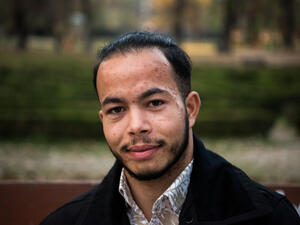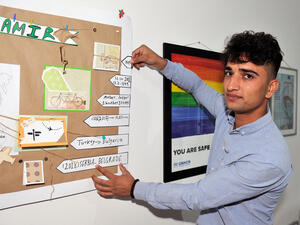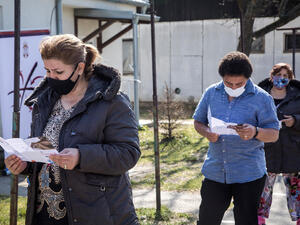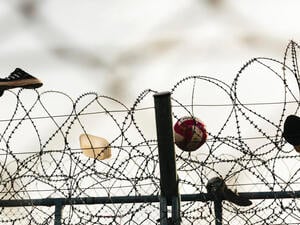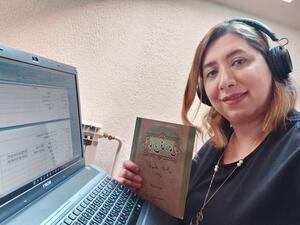Kosovo Crisis Update
Kosovo Crisis Update
Returns
More than 4,400 refugees and displaced people returned to Kosovo last week, about 3,100 of them from countries outside the Balkan region and the rest from Montenegro, Albania, the FYR of Macedonia and Bosnia and Herzegovina.
Those who returned from the region included 70 refugees who joined the first airlift to Kosovo from Bosnia and Herzegovina on 26 August.
Of the returns from outside the Balkan region last week, 1,018 flew into Skopje in the FYR of Macedonia and took buses to Kosovo and 1,296 took direct flights to the Serbian provincial capital, Pristina. An estimated 800 Kosovars from other countries in Europe went back to Kosovo through Albania.
Some 772,300 Kosovars have returned to Kosovo since the peace agreement in June - 718,000 from the region and 54,300 from other countries in Europe, North America and Oceania.
Around 43,200 refugees and displaced people remain in the region, including 7,700 in Montenegro, 6,500 in Albania, 10,190 in Bosnia and Herzegovina and 18,800 in FYR of Macedonia.
Serbs and Roma
Reports of attacks on Serbs in Kosovo decreased for the first time last week, KFOR officials report in Pristina, despite several incidents of abductions and intimidation. The drop could be attributed to KFOR's success in establishing a more secure environment. It also reflects a diminishing Serb population to target.
An estimated 200,000 Serb and Roma people who fled their homes in Kosovo have arrived in the Federal Republic of Yugoslavia, according to figures from the Yugoslav Red Cross and local municipal authorities. The count includes 173,000 in Serbia proper, 23,500 in Montenegro and 3,257 refugees from Croatia and Bosnia and Herzegovina. UNHCR could not independently confirm these figures.
With the school year opening this week, the Yugoslav Ministry of Education has announced temporary arrangements on student enrolment. One measure calls for the admission of children from Kosovo in schools in border municipalities in Serbia. Teachers forced to leave Kosovo will be hired temporarily to teach in the schools.
In a move reflecting continuing economic decline, the Serbian government has issued a decree announcing pensions for May, June and July will be paid in coupons to be used for paying electricity bills, coal and wood for heating.
Of the 23,500 Serbs and Roma who are in Montenegro, 431 arrived last week. They include 282 Roma people who came from an encampment beside a cemetery in Kosovo's western town of Djakovica, which is now empty. Of these arrivals, 240 requested accommodation at Konik camp. Up to 800 Roma people had gathered at the cemetery in Djakovica over the past two months following attacks by returning ethnic Albanians on their homes.
At Podgorica more than 1,600 Roma people are in tents and 331 in shantytown barracks. Some 2,000 to 3,000 are in private accommodation. A new settlement is being built and will be occupied once water and sanitation facilities have been installed.
At Niksic 540 Roma people are in five sites. UNHCR has requested the government to confirm whether a camp settlement may be established by international agencies in the area. Current living conditions there are unsatisfactory although shacks are supplied with electricity and water is available.
In the FYR of Macedonia, 705 Roma and 10 Serbs from Kosovo arrived last week. Most of them came from Kosovo's Gnjilane area in the east. UNHCR staff are talking to these people to verify their areas of origin and reasons for their departure.
Kosovo
The first shipment of 1,000 winter tents arrived last week in Pristina and was distributed to UNHCR's different warehouses in the province. It is part of 15,000 winter-proof tents that UNHCR has procured, along with stoves. These tents will be distributed once the stoves arrive, expected this week.
The tents are designed to support temporarily families whose houses have been totally destroyed and are uninhabitable - those in Category 4 and 5 under UNHCR's shelter programme. Around 50,000 houses are in this category.
The tents will be distributed to families who have returned to their villages and are meant to allow them to stay near their houses and get them through this winter. UNHCR is also looking at communal centres to shelter homeless Kosovars this winter.
Meanwhile, UNHCR has so far distributed 6,000 basic shelter kits to enable home owners to temporarily weatherproof one room in their house before winter. The kits contain reinforced, heavy duty plastic sheeting for roof repairs, as well as translucent plastic for windows, timber, plywood, nails, staples, tape and tools.
UNHCR is handling a third, or around 15,000, of the total provision of shelter kits. The European Community Humanitarian Office (ECHO) is providing 20,000 of these kits and the U.S. Office of Foreign Development Assistance (OFDA) another 20,000. In all, the kits from the three agencies will benefit an estimated 387,000 people whose houses have damage ranging from 20 to 60 percent. At least four other organizations have pledged kits or prefab houses, bringing the total number to more than 75,000 kits.
In another development, UNHCR signed last week seven more contracts, bringing to 21 the number of project agreements concluded since UNHCR resumed operations in Kosovo in mid-June. The new agreements signed include repair of 44 schools in Pristina, Urosevac, Pec and Gnjilane, community services assistance in Pec, Prizren and Djakovica, mine detection, marking and clearance in selected areas, cleaning and maintenance of wells and water systems and reproductive health activities in Prizren, Lipljan and Urosevac.
Albania
UNHCR has allocated $3.8 million for 74 quick impact projects (QIPs) in areas which previously hosted refugees in Albania. Of the projects, nine have been completed and work is going on in six others.
The projects include the rehabilitation of camps, repair of community centres, water systems and parks. The NGO International Rescue Committee acts as an umbrella group for 23 agencies involved in the UNHCR QIPs in 11 prefectures. The total value of ongoing and completed projects is $1 million and the average project cost is $51,000.
Last week, UNHCR signed an agreement with the Albanian Education Development Project on school reconstruction and the printing of illustrated books for children. This also involves provision of non-formal education, entertainment and stress relief to young refugees and children subjected to trauma, abuse or mistreatment.
UNHCR is closing field offices in Elbasan and Shkodra and some of the furniture and equipment there will be turned over to the prefectures in appreciation of their support during the Kosovo emergency. Other items will be given to agencies implementing QIPs.
FYR of Macedonia
UNHCR has moved 48 refugees in 13 families from camps in the FYR of Macedonia to host families as part of its preparations for winter. Around 5,000 refugees from Kosovo, including Roma, are still in three camps in the country.
A detailed plan on transferring refugees from camps before the snow falls is being worked out. The plan includes distribution of food, blankets, mattresses and other relief items for both refugees and host families.
Repairs on three collective centres - Dara Bombol, Gazi Baba and Radusa - are continuing and are expected to be completed by the end of September. Shelter repair programmes are also continuing for host families in various areas. These are funded by UNHCR and donor countries.
Meanwhile, NGOs are continuing the clean up of Stenkovec 1 and Bojane camps. Stenkovec 1 hosted as many as 20,000 refugees and Bojane 4,400 at the height of the Kosovo crisis.



